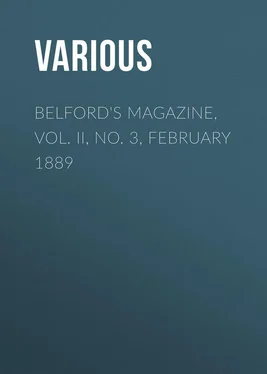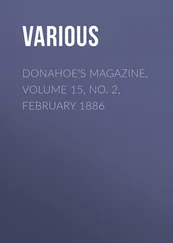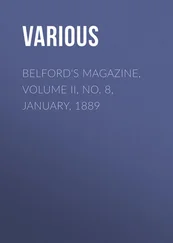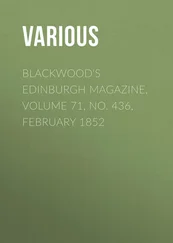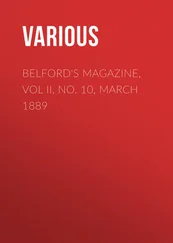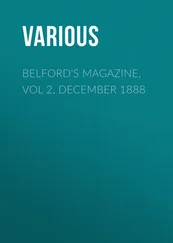Various - Belford's Magazine, Vol. II, No. 3, February 1889
Здесь есть возможность читать онлайн «Various - Belford's Magazine, Vol. II, No. 3, February 1889» — ознакомительный отрывок электронной книги совершенно бесплатно, а после прочтения отрывка купить полную версию. В некоторых случаях можно слушать аудио, скачать через торрент в формате fb2 и присутствует краткое содержание. Издательство: Иностранный паблик, Жанр: periodic, foreign_edu, на английском языке. Описание произведения, (предисловие) а так же отзывы посетителей доступны на портале библиотеки ЛибКат.
- Название:Belford's Magazine, Vol. II, No. 3, February 1889
- Автор:
- Издательство:Иностранный паблик
- Жанр:
- Год:неизвестен
- ISBN:нет данных
- Рейтинг книги:5 / 5. Голосов: 1
-
Избранное:Добавить в избранное
- Отзывы:
-
Ваша оценка:
- 100
- 1
- 2
- 3
- 4
- 5
Belford's Magazine, Vol. II, No. 3, February 1889: краткое содержание, описание и аннотация
Предлагаем к чтению аннотацию, описание, краткое содержание или предисловие (зависит от того, что написал сам автор книги «Belford's Magazine, Vol. II, No. 3, February 1889»). Если вы не нашли необходимую информацию о книге — напишите в комментариях, мы постараемся отыскать её.
Belford's Magazine, Vol. II, No. 3, February 1889 — читать онлайн ознакомительный отрывок
Ниже представлен текст книги, разбитый по страницам. Система сохранения места последней прочитанной страницы, позволяет с удобством читать онлайн бесплатно книгу «Belford's Magazine, Vol. II, No. 3, February 1889», без необходимости каждый раз заново искать на чём Вы остановились. Поставьте закладку, и сможете в любой момент перейти на страницу, на которой закончили чтение.
Интервал:
Закладка:
Although some colored men had been enlisted in Louisville and, under the authority of General Hunter, in South Carolina, the above order was the first formal recognition of this class of troops by the Government.
The Inspectors were to supervise at such points as might be indicated by the War Department "in the Northern and Western States," but recruiting stations and depots were to be established by the Adjutant-general as circumstances should require: the first clause expressing the conservatism of President Lincoln, and the second affording a wider range for the energies of Secretary Stanton.
The first Inspector detailed was Colonel William Birney, of the 4th New Jersey Volunteers. He was an Alabamian by birth, the son of James G. Birney, who had been the Presidential candidate of the Liberty party in 1840 and 1844. He had enlisted as a private and been elected Captain in the 1st New Jersey, had served through the different regimental grades, and had just been nominated to the Senate as Brigadier-general. At the beginning of the war he predicted to his friends, Secretary Chase and Henry Wilson (chairman of the Senate Committee on military affairs), the exigency for calling colored troops into the service, and had offered, in that event, to aid in organizing them without regard to his grade in the white troops. Hence his detail after more than two years' waiting.
Reporting at Washington in the first days of June for his new duty, Colonel Birney was kindly received by the Secretary of War, but found that neither he nor Mr. Lincoln had marked out any definite line of action or had any orders ready to give him. Day after day his anxious inquiries were met by the same answer:
"Wait a little longer; we are not ready yet."
Finally, about the 10th of June, weary with oscillating between the Ebbitt House and the War Department, the Colonel asked leave of Mr. Stanton to organize a colored regiment at Washington. Written orders were refused, but oral permission to do what he could was granted him. He went to work at once, and before the 18th of June he had enlisted, uniformed, armed, and equipped four hundred men, gathered from Washington, Georgetown, Alexandria, and the country beyond. They were of course very raw material, but their habits of obedience and temperance were equivalent to the usual quickness and independence of the white troops. They were proud of their new position and enthusiastic in learning the manual of arms, even rising at four o'clock in the morning to begin their drill, which they practised incessantly through the day. The brightest among them were made sergeants and corporals, while young officers from the white regiments around Washington were detailed to serve as captains and lieutenants.
By the end of the month the 1st U. S. Colored Regiment was full, and Colonel Birney marched it down the avenue, past the White House to the Capitol, and back; affording a rare spectacle to the crowds that followed it, and one which the old inhabitants of the city certainly had never expected to see. But there they were, ten companies of black, brown, and yellow men, ex-slaves, dressed in the uniform of the United States, armed and equipped like white soldiers, and pledged to stand by the Government in its struggle with their former masters. They made a fine appearance, marching quite as well as white soldiers, and calling forth many compliments for themselves and their officers.
Still no orders came from the War Department, and it was some time before Colonel Birney understood the cause of the delay. Recruiting for colored troops had been begun in Philadelphia and Boston, but progressed slowly; and at Washington men were not obtained in any great numbers from the resident free people of color, but were mostly fugitive slaves from Maryland and Virginia. Colonel Birney represented to Mr. Stanton the advantages of recruiting, in the States named, and the superiority as soldiers of the men raised on farms to those gathered in the alleys and slums of northern cities.
The Secretary listened attentively, and after reflecting a few moments, said:
"Go over to the White House and have a talk with the President. Don't say that I sent you. We will talk the matter over afterwards."
The Colonel was promptly admitted to Mr. Lincoln's presence, and a complimentary remark of the President on the excellent appearance made by the colored regiment opened the way for his visitor to give his views about recruiting from the Maryland farms.
"What!" exclaimed Mr. Lincoln; "you surely do not mean that we should take the slaves?"
"Mr. President," replied the Colonel, "a man's allegiance to his Government is not subordinate to claims of private parties upon him. If he is willing to fight for his country he should be allowed to do it."
"But my pledge!" said Mr. Lincoln. "You forget my pledge to the loyal slave States, in my proclamation of emancipation."
Here, then, was the point of difference between Mr. Stanton and the President. The former was willing to recruit colored troops in the loyal slave States, and the latter was opposed to it.
Of course the subject was dropped.
On the 28th of June Col. Birney was ordered to Norfolk to recruit slaves of rebels, but he had scarcely begun when another order brought him back to Washington.
Arriving about the 4th of July, Mr. Stanton showed him a letter from General Schenck, commanding the district of Maryland, stating that large numbers of free men of color had been gathered at Baltimore to work on the fortifications, and that a competent officer, if sent at once, might get a great many recruits among them. In answer to the Secretary's question of what he thought of this, Colonel Birney answered:
"I can organize several regiments in Baltimore, but probably not from the class mentioned by General Schenck. Free colored men will not fight to help the Government maintain slavery in Maryland; and that is the President's pledge. But the slaves will enlist, for they will get their freedom by it. If you send me to Maryland it must be with the knowledge that I will never recognize one man's right of property in another. I believe, with the Vermont justice, that the only proof of such a right is a deed signed and sealed by the Creator."
Mr. Stanton laughed. "Well," he said, "whatever you do, remember you do it on your own responsibility." This was repeated and emphasized.
The Colonel accepted the terms, asking the favor, however, that Mr. Stanton would do what he could for him in the event of the President's displeasure. This was cheerfully promised, and the necessary orders were then made out. A letter also was written to General Schenck directing him to recognize Colonel Birney as in charge of the recruiting of colored troops in Maryland, and to have his requisitions honored by the ordinance, commissary, and quartermaster officers. That is, the Colonel was to have carte blanche for his special business.
The large barracks near Druid Hill Park having been assigned for his use by General Schenck, who named them "Birney Barracks," the Colonel telegraphed for the 1st Regiment. As the "Plug Uglies" before the war, and the attacks made on the first northern volunteers by the Baltimore populace, had given that city the reputation of being peopled chiefly by roughs and rebels, it was thought best to have a sufficient force there to overawe the violent.
The regiment, under command of Colonel Holman, arrived at night without accident. It was put into good condition, and a few days later, with Colonel Birney riding at its head, was marched, with music, flying colors, and fixed bayonets, through the principal streets of the city, causing immense excitement and some apprehension among all classes. Doors and blinds were hastily closed, and the police gathered in force to be ready to repress disorders. But none occurred. One man was arrested for hurrahing for Jeff Davis; but this, scarcely worth noticing, was the only incident that indicated rebel sentiment.
Читать дальшеИнтервал:
Закладка:
Похожие книги на «Belford's Magazine, Vol. II, No. 3, February 1889»
Представляем Вашему вниманию похожие книги на «Belford's Magazine, Vol. II, No. 3, February 1889» списком для выбора. Мы отобрали схожую по названию и смыслу литературу в надежде предоставить читателям больше вариантов отыскать новые, интересные, ещё непрочитанные произведения.
Обсуждение, отзывы о книге «Belford's Magazine, Vol. II, No. 3, February 1889» и просто собственные мнения читателей. Оставьте ваши комментарии, напишите, что Вы думаете о произведении, его смысле или главных героях. Укажите что конкретно понравилось, а что нет, и почему Вы так считаете.
